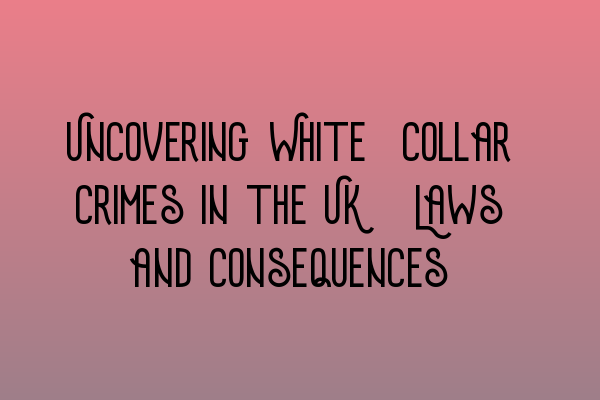Uncovering White-Collar Crimes in the UK: Laws and Consequences
White-collar crimes have gained notable attention in recent years. These non-violent crimes, typically committed by professionals or business individuals, encompass a wide range of illegal activities such as fraud, embezzlement, money laundering, bribery, and insider trading. They pose significant threats to the economic stability and integrity of both individuals and organizations alike. In this article, we will delve into the laws and consequences surrounding white-collar crimes in the UK, shedding light on the severity of these offenses and the legal measures taken to combat them.
The Legal Framework in the UK
In the UK, white-collar crimes are primarily governed by legislation such as the Fraud Act 2006, the Proceeds of Crime Act 2002, and the Bribery Act 2010. These laws provide the necessary tools to investigate, prosecute, and penalize individuals involved in such illegal activities.
Under the Fraud Act 2006, offenses such as false representation, fraud by failing to disclose information, and fraud by abuse of position are criminalized. The legislation also covers fraudulent trading, possession, and making or supplying articles for use in fraud.
The Proceeds of Crime Act 2002 focuses on money laundering offenses. It imposes various obligations on individuals and organizations to implement anti-money laundering measures, such as reporting suspicious transactions and carrying out customer due diligence procedures.
The Bribery Act 2010 tackles the issue of corruption and bribery. It applies to individuals and businesses, imposing strict liability for offering, promising, giving, requesting, or accepting bribes. This legislation puts an emphasis on ensuring transparency and ethical conduct in the business world.
Consequences of White-Collar Crimes
The consequences of engaging in white-collar crimes can be severe. Individuals found guilty may face imprisonment, hefty fines, confiscation of assets, and a tarnished reputation. Additionally, directors and executives may be banned from holding certain positions in a company or acting as company directors in the future.
Not only do white-collar crimes harm individuals directly affected by the offenses, but they also have far-reaching implications for the wider community. Such crimes can result in financial loss, damage public trust, and undermine the integrity of the business environment.
Uncovering White-Collar Crimes
Uncovering white-collar crimes requires a dedicated approach from investigative authorities, legal professionals, and the public. Implementing robust internal controls and compliance systems can help organizations prevent these crimes from occurring. Regular audits, risk assessments, and thorough due diligence are crucial in detecting and preventing fraudulent activities.
Law enforcement agencies and regulatory bodies play a crucial role in uncovering and investigating white-collar crimes. They have the expertise and resources to identify suspicious activities, conduct thorough investigations, and gather evidence to pursue criminal charges.
For individuals who suspect white-collar crimes, it is essential to report any suspicions to the appropriate authorities. Whistleblower protections exist to encourage the reporting of illegal activities without fear of retaliation. This highlights the significance of fostering a culture of accountability and responsibility.
Conclusion
White-collar crimes pose significant risks to individuals, businesses, and society as a whole. The UK has implemented a robust legal framework to combat these offenses with legislation such as the Fraud Act 2006, the Proceeds of Crime Act 2002, and the Bribery Act 2010. Engaging in white-collar crimes can result in severe consequences, including imprisonment, fines, asset confiscation, and reputational damage.
Uncovering and preventing white-collar crimes requires a collaborative effort from organizations, law enforcement agencies, and the public. By promoting transparency, implementing internal controls, and encouraging reporting through whistleblower protections, we can work towards a society free from the detrimental effects of white-collar crimes.
Related Articles:
- SQE 1 Practice Exam Questions
- SQE 1 Practice Mocks FLK1 FLK2
- SQE 2 Preparation Courses
- SQE 1 Preparation Courses
- SRA SQE Exam Dates
